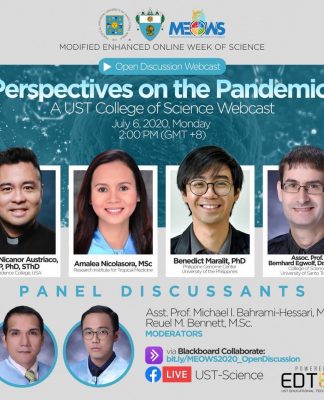AGRICULTURE Secretary Leonardo Montemayor urged Thomasian researchers to find ways to prolong the shelf life of agricultural products.
In a symposium at the Thomas Aquinas Research Complex Auditorium last July 26, Montemayor said developing ways of extending the shelf life of natural produce would lead to higher income for farmers.
He said many farmers abandon farming because of the low price for their products due to their perishable nature.
“A farmer will not continue to cultivate the soil if he will not earn enough for his crops,” Montemayor said in Filipino.
By prolonging the shelf life of agricultural products, the country’s post-harvest losses can be trimmed down, which is approximately 10 per cent of the total agricultural products.
To help cut down the country’s post-harvest losses, Montemayor said the Department of Agriculture (DA) is spending on multi-purpose pavements, which palay farmers can use for drying grain.
“There could have been a good palay harvest. But since places for drying palay are scarce, the farmers will now use the highways to dry their palay,” Montemayor said in Filipino.
Meanwhile, Montemayor said the country’s food security issue is difficult—trying to balance the supply and demand. He said that from the point of view of the consumer, the person’s economic state plays an important role.
“You can have all the food in the world, but if the consumer does not have the job that would provide him the income, then he has no food security. There must be an assurance of adequacy of income arising from a job in order to arrive at food security,” Montemayor said.
Montermayor mentioned three A’s—adequacy, availability, and accessibility of food— to consider from the supplier’s point of view. He added that these three A’s should work together.
“There must be adequate food (and) enough supply (of food which must) be available at the right time and place and the food must be accessible (in order to be purchased),” he said.
He added that the archipelagic nature of the Philippines complicates the problem because it makes food shipment harder, more so when typhoons hit the country.
Sponsored by the UST Chemical Engineering Society and UST Department of Chemical Engineering, the forum tackled the theme “Food Security in the Philippines: A Step Towards Global Competitiveness.”
Meanwhile, Department of Social Welfare and Development (DSWD) Secretary Corazon Soliman, through a representative reading her speech, said the economic status of Filipinos plays a major factor in their food security.
Citing a World Bank study, Soliman said that nearly half of the respondents chose to change their eating patterns to cope with the economic crisis.
Soliman said poverty alleviation is the key to attain food security in the country.
“DSWD’s part in establishing food security lies in its role in social protection and the empowerment of the poor,” Soliman said.
Meanwhile, former DA Undersecretary Demare Raval, reading Senator Edgardo Angara’s speech, said there should be a consistent increase in agricultural production which should at least be higher than the country’s population growth if food security is to be attained.
“Because our population increases by 2.3 per cent yearly, agricultural production should increase by three to four percent if we are to increase the availability of food and upgrade living standards,” Raval said.















